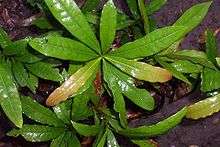Beilschmiedia obtusifolia
| Beilschmiedia obtusifolia | |
|---|---|
 | |
| Blush walnut - juvenile | |
| Scientific classification | |
| Kingdom: | Plantae |
| (unranked): | Angiosperms |
| (unranked): | Magnoliids |
| Order: | Laurales |
| Family: | Lauraceae |
| Genus: | Beilschmiedia |
| Species: | B. obtusifolia |
| Binomial name | |
| Beilschmiedia obtusifolia F. Muell. ex Meissner.[1] | |
Beilschmiedia obtusifolia is a rainforest laurel indigenous to eastern Australia. It ranges, roughly, from the Manning River (31° S) in New South Wales to the Daintree River (16° S) in Queensland, within tropical and sub tropical rainforests, usually on the more fertile basaltic sites, but sometimes close to the sea. Its common names include blush walnut, hard bolly gum, and nut wood.[2]
Description
A medium to large tree reaching to 37 metres tall[3] and one metre in trunk diameter. The cylindrical trunk is brown or creamy with vertical lines of raised pustules. The trunk features scales with round depressions, colloquially known as "bollies", similar to the related Bollygum, Litsea reticulata. The tree's base is flanged in larger specimens.
Shoots and stems hairy. The elliptic or reverse lanceolate shaped leaves are alternate and not toothed, 8 to 10 cm long and 2 to 4 cm wide. Bluntly pointed or sometimes notched at the tip. Leaf stalks 5 mm long. Leaf venation is prominent on both sides, with a raised midrib.
Cream flowers form in panicles from October to November, the flowers have an unpleasant scent. The fruit ripens December to July, being a black egg shaped drupe with a scented green oily aril. 20 to 30 mm long with a single seed inside. As with most Australian laurels, removal of the fleshy aril is advised to assist seed germination, which is slow but fairly reliable with Beilschmiedia obtusifolia.
The fruit is eaten by a variety of birds, including the rose-crowned fruit dove, topknot pigeon, green catbird and wompoo fruit dove.
References
- ↑ "Beilschmiedia obtusifolia". Australian Plant Name Index (APNI), IBIS database. Centre for Plant Biodiversity Research, Australian Government, Canberra. Retrieved 26 July 2013.
- ↑ Hyland, B. P. M.; Whiffin, T.; Zich, F. A.; et al. (Dec 2010). "Factsheet – Beilschmiedia obtusifolia". Australian Tropical Rainforest Plants. Edition 6.1, online version [RFK 6.1]. Cairns, Australia: Commonwealth Scientific and Industrial Research Organisation (CSIRO), through its Division of Plant Industry; the Centre for Australian National Biodiversity Research; the Australian Tropical Herbarium, James Cook University. Retrieved 26 July 2013.
- ↑ Wingham Brush Nature Reserve Pamphlet, National Parks & Wildlife Service of New South Wales 2008
- Floyd, A.G., Rainforest Trees of Mainland South-eastern Australia, Inkata Press 1989, ISBN 0-909605-57-2
- "Beilschmiedia obtusifolia". PlantNET - NSW Flora Online. Retrieved 2009-08-03.